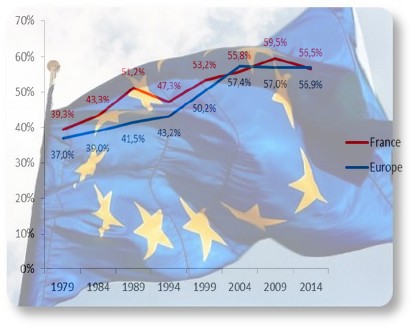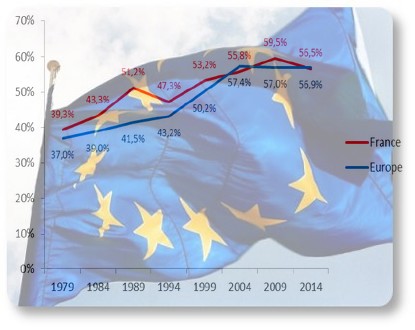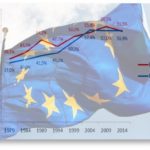Nice Premium owes this analysis of the vote and the result of the European elections to the availability of Frédéric Ganneval, which, as Artenice announced a few days ago, “is not a surprise”.
 In France as in Europe, the victory of abstention before that of euro-skeptics or euro-detractors
In France as in Europe, the victory of abstention before that of euro-skeptics or euro-detractors
Evolution of the abstention rate in France and Europe since 1979
Since 1979, when the election of MEPs has been conducted by direct universal suffrage, no one has grasped the extent of voter disaffection. In 1994 in France, a spurt in participation was provoked mainly by the participation of a list led by Bernard Tapie, which won 13 out of the 85 seats allocated to France. Since then, abstention has been breaking records until 2009.
In 2014, the French abstention rate reached the European average. This renewed participation in France (+3 points/2009) is explained by the expression of discontent already expressed during the municipal elections about the economic situation in France (34% of voters), the disenchantment of voters with the political class in general, but also by the fear that Europe is not acting in the interest of the French people; moreover, the specter of the transatlantic treaty also weighed on this election.
This pandemic level of abstention should have been enough on its own to mobilize the European institution to better communicate its role and importance. Instead, the political class in its majority and the media have continuously proclaimed that, losing their local power, governments must adhere to European directives, and roughly if they failed or did not do what they wanted, it was Europe’s fault.
Therefore, it is not surprising to see voters’ disinterest in the European institution, or as observed today, their rejection.
The euro-skeptic tidal wave in Europe
For the reasons just mentioned, we can observe a significant rise of the parties euphemistically called
euro-skeptics or even totally hostile to Europe (approximately 145 seats obtained out of 751, or 19%).
Even if this surge stems from a rejection of Europe, the visions are very disparate, ranging from the UKIP in England, which does not want an alliance with the FN which it deems too controversial, to Nazi or neo-Nazi candidates in Germany, the Netherlands, or Greece, considered unacceptable by the French FN, which continues its politically correct makeover to become a lasting part of the French political landscape.
To form a parliamentary group, it is necessary to gather 25 MEPs from at least 7 different countries. Therefore, to create one or more political groups within the European Parliament, euro-skeptics need to unite around their common visions: immigration, national protectionism, the enlargement issue, etc.
But the stake for euro-skeptics is not only a European one. These parties will do their utmost through this election to gain credibility with their electorate to present their lists in presidential elections in each of their countries.
This goal is not yet achieved. The rejection of Europe expressed today concerns only 8% of the European electorate (19% of the 43% of voters who participated in this election) or still 11% of the French electorate.
Is the FN a real earthquake as seen everywhere?
The FN arrives vastly in the lead in this election. 4.5 million French people voted for the FN during this election, compared to 5.5 million in the last presidential election of 2012.
All surveys (for once) were not mistaken, though they did not anticipate the significant gap dug by the FN with other political formations. This is not a new April 21 scenario but a thoughtful vote choice.
What’s new in this election is that the “danger” of the National Front being the first political force in this election, hammered by the media, did not scare voters. 84% of them voted FN to express their rejection of Europe.
However, can we say it is a signal sent to the government? 55% of voters declare they did not consider the French situation when making their decision, and only 34% viewed it as a national issue.
Everything was set for this scenario to unfold: an abstention still too high, an economic situation not improving and which some economists call “the worst crisis since 1929”, a discredited government despite the arrival of Manuel Valls, and finally, ongoing scandals… like Bygmalion and especially an FN in full
makeover, which managed to mobilize its young electorate (43%), from modest social categories and poorly educated.
It is not about playing ostrich nor demonizing the FN. This result will have to be taken into account for traditional French parties to transform and debate substantively with the FN to hope to counter it. It is still too early to draw a shortcut that would lead the FN to the steps of the Elysée. Remember, the FN achieved 1 million fewer votes than in the last presidential election.
This strong signal sent to the French political class does not yet make the FN the foremost party in France, at least not yet.
by Frédéric Ganneval,
co-founder of Artenice



